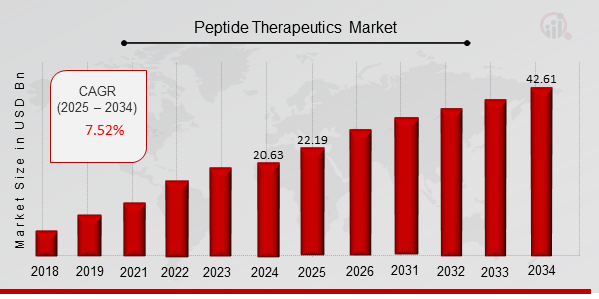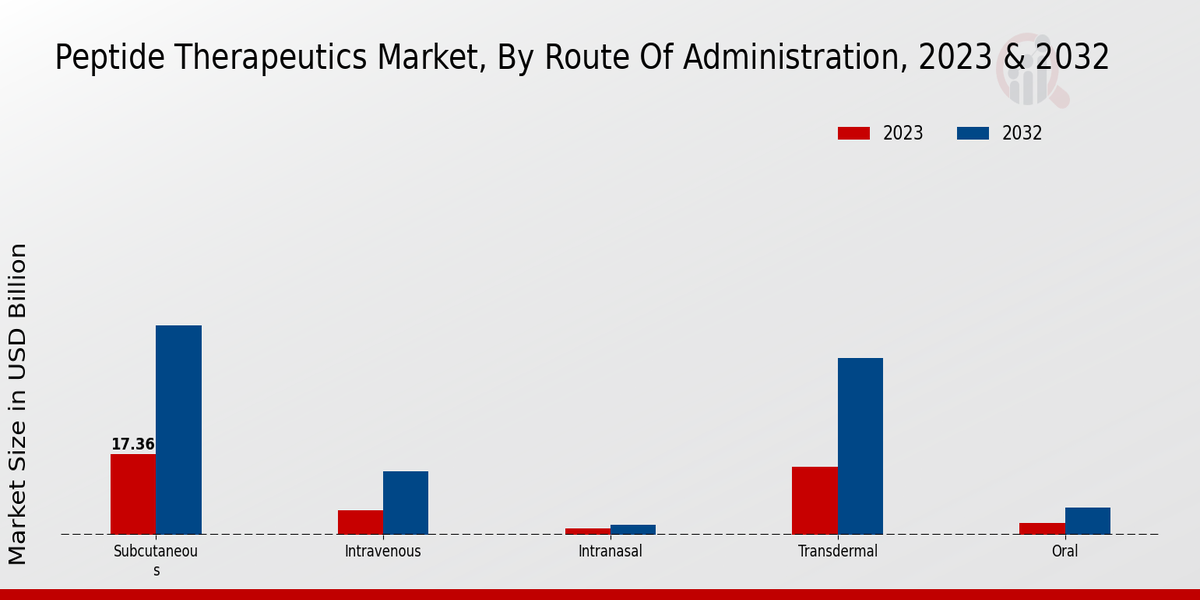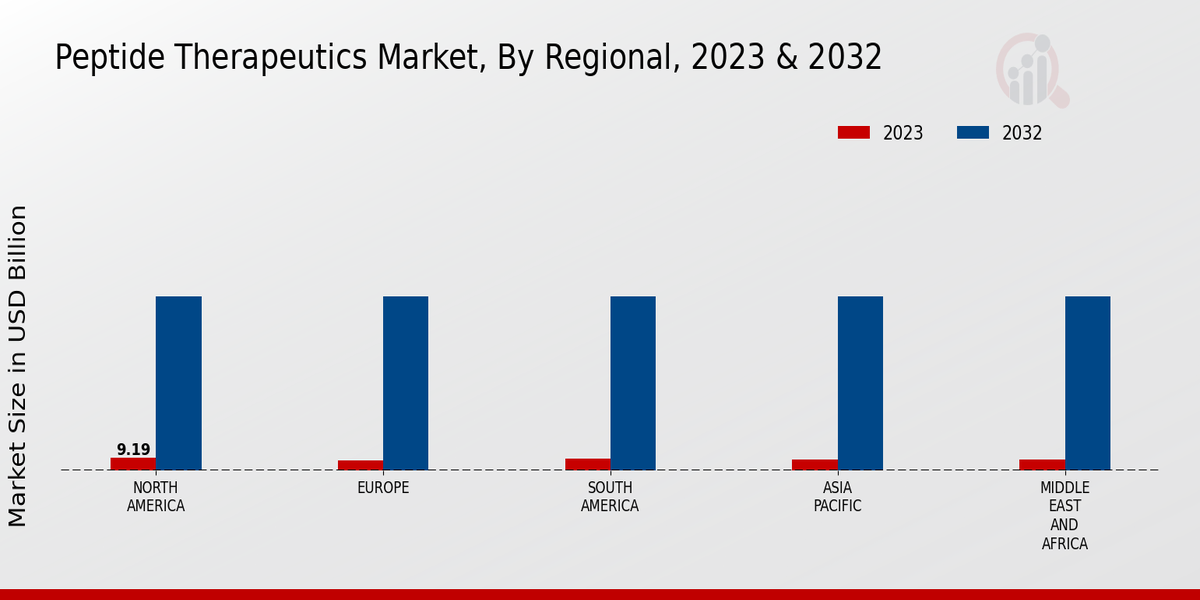Peptide Therapeutics Market Overview
As per MRFR analysis, the Peptide Therapeutics Market Size was estimated at 20.63 (USD Billion) in 2024. The Peptide Therapeutics Market Industry is expected to grow from 22.19 (USD Billion) in 2025 to 42.61 (USD Billion) till 2034, at a CAGR (growth rate) is expected to be around 7.52% during the forecast period (2025 - 2034).

Source: Primary Research, Secondary Research, MRFR Database and Analyst Review
Key Peptide Therapeutics Market Trends Highlighted
The Peptide Therapeutics market continues to expand rapidly, driven by key factors such as the rising prevalence of chronic diseases, increasing awareness of peptide-based therapies, and advancements in peptide synthesis technologies. These factors are creating opportunities for companies to develop and commercialize innovative peptide-based therapeutics, particularly in areas such as oncology, immunology, and CNS disorders.
Recent trends in the market include the emergence of novel peptide delivery systems, including nanocarriers and cell-penetrating peptides, which enhance the bioavailability and efficacy of peptide therapeutics. Additionally, the growing adoption of precision medicine approaches is driving the development of personalized peptide therapeutics tailored to individual patient profiles. The market is also witnessing increasing collaborations between pharmaceutical companies and biotechnology startups, fostering innovation and accelerating the development of new peptide-based treatments.
Peptide Therapeutics Market Drivers
Technological Advancements in Peptide Synthesis
In recent years, innovative technologies have been introduced in the peptide synthesis industry, contributing to the expansion of the peptide therapeutics market. These technologies include solid-phase peptide synthesis and microwave-assisted peptide synthesis. The two approaches revolutionize the process of peptide production and facilitate the cost-effective synthesis of peptides, including complex molecules. With the assistance of these approaches, the synthesis of peptides with superior potency and selectivity is possible, providing control over the sequence and modification of peptides.
Moreover, advancements in the field of peptide conjugation and the introduction of new techniques, such as the novel site-specific conjugation approach, expand the horizons regarding the functions that can be achieved with peptide-based therapeutics, as well as the possible targeting moieties.
Rising Prevalence of Chronic Diseases
The surging cases of chronic diseases, such as cancer, cardiovascular diseases, and diabetes, have propelled the need for novel therapeutic interventions. Peptide therapeutics are emerging as the best approaches for tackling these diseases since they are highly specific and targeted. Peptides can be modulated to restrain certain disease-related proteins, or they can be formulated to impact immune responses. Owing to the increasing realization of the appropriateness of peptide therapeutics in handling unmet medical requirements, the Peptide Therapeutics Market Industry is on a growth trajectory.
Government Support and Funding
Peptide therapeutics have been recognized by governments from all over the world as potentially beneficial and, as such, have been offered a great deal of support in terms of research efforts and overall market dynamics. Grants and regulatory frameworks have been initiated to help stimulate the growth of such a sub-field, while combined efforts realized by academia, industry, and governmental bodies have pushed the envelope on what can be expected of this type of treatment.
This has naturally contributed to the subsequently formed favorable environment in the Peptide Therapeutics Market Industry, defining and recruiting potential investors and ensuring that new and novel treatments are constantly in demand.
Peptide Therapeutics Market Segment Insights
Peptide Therapeutics Route of Administration Insights
The Peptide Therapeutics Market has been segmented by the route of administration into Subcutaneous, Intravenous, Intranasal, Transdermal, and Oral. The Subcutaneous segment is expected to hold the largest share in 2023, as it is the easiest state and cost-efficient method of drug administration. The Intravenous segment is expected to be the second-largest segment due to the high bioavailability and rapid onset of action of this route. On the other hand, the Intranasal segment is anticipated to be the fastest-growing, as the number of nasal sprays and inhalers for peptide drug delivery is increasing.
The Transdermal segment is expected to grow constantly due to the ease of administration and less invasiveness of this route. The oral segment is anticipated to have the smallest share, as this route is characterized by low bioavailability and peptides that can be easily degraded in the intestine. The driving factors of this market are the increasing prevalence of chronic diseases, such as cardiovascular diseases, respiratory diseases, cancer, and autoimmune and infectious diseases. Of the 30,000 to 40,000 protein-coding genes located in the human genome, 700 of them may encode peptide hormones, which are associated with the etiology and pathogenesis of many different disease states.
In addition, the interest in personalized medicine and developments in peptide synthesis and delivery technologies play a major role in the increase of this market. The Peptide Therapeutics Market is very fragmented and involves many small and large players. The largest ones include Eli Lilly and Company, Novo Nordisk A/S, and Merck Co., Inc.. These companies are constantly working on new products.

Source: Primary Research, Secondary Research, MRFR Database and Analyst Review
Peptide Therapeutics Disease Indication Insights
The Peptide Therapeutics Market has been segmented by Disease Indication into Oncology, Endocrine Disorders, Autoimmune Diseases, Infectious Diseases, and Cardiovascular Diseases. These segments provide a deep analysis of the dynamics of the healthcare market. In 2023, oncology held the largest revenue share, which was about 45% of the total market. This segment is expected to dominate the market because cancer is one of the leading causes of death worldwide, and peptide molecules become widely used in the field of cancer treatment. Endocrine Disorders is another prominent segment that may reach a valuation of USD 15.23 billion by 2032.
The significant reasons for this are the high prevalence of diabetes and thyroid disorders. Autoimmune Diseases, Infectious Diseases, and Cardiovascular Diseases will somewhat grow.
Peptide Therapeutics Molecular Weight Insights
The Peptide Therapeutics Market segmentation by Molecular Weight includes Less than 5,000 Da, 5,000-10,000 Da, 10,000-20,000 Da, and More than 20,000 Da. Among these, the Less than 5,000 Da segment accounted for the largest market share in 2023, owing to the presence of a large number of approved peptide therapeutics with molecular weights below 5,000 Da. For instance, in 2023, the Less than 5,000 Da segment accounted for approximately 60% of the Peptide Therapeutics Market revenue. The 5,000-10,000 Da segment is expected to witness the highest growth rate during the forecast period, owing to the increasing number of peptide therapeutics with molecular weights in this range entering the market.
For instance, in 2024, the 5,000-10,000 Da segment is projected to grow by approximately 15% year-over-year.
Peptide Therapeutics Delivery Technology Insights
The Delivery Technology segment plays a pivotal role in the Peptide Therapeutics Market, contributing significantly to its overall growth. Nanocarriers, a key delivery technology, are projected to account for a substantial share of the market in 2023, with a projected revenue of $15.2 billion. Nanocarriers offer enhanced drug delivery efficiency, targeted therapy, and reduced systemic toxicity, driving their growing adoption. Liposomes, another delivery technology, are anticipated to maintain a significant presence in the market owing to their ability to encapsulate both hydrophilic and hydrophobic drugs and improve their bioavailability.
Micelles, with their ability to self-assemble into core-shell structures, are also gaining traction in the Peptide Therapeutics Market. Conjugation with other molecules, such as antibodies or peptides, is another promising delivery technology that enables targeted drug delivery and increased therapeutic efficacy. Sustained-release formulations, designed to gradually release drugs over time, are projected to witness increasing adoption, particularly for chronic diseases, offering improved patient compliance and reduced dosing frequency.
Peptide Therapeutics Therapeutic Action Insights
The Therapeutic Action segment plays a pivotal role in the Peptide Therapeutics Market, encompassing various therapeutic applications of peptide-based drugs. Immunomodulation holds a significant share of the market, driven by the growing prevalence of immune disorders and the development of immunotherapies. Hormonal Regulation represents another key segment, with peptides acting as hormones or hormone analogs to treat endocrine disorders and metabolic diseases. Antimicrobial peptides exhibit strong growth potential due to the rising threat of antimicrobial resistance.
Anti-inflammatory peptides hold promise in treating chronic inflammatory conditions, while Anticancer peptides are gaining attention for their targeted and less toxic approach to cancer treatment. The Peptide Therapeutics Market is projected to reach $47.23 billion by 2024, with a CAGR of 14.5%, highlighting the substantial growth opportunities within the Therapeutic Action segment.
Peptide Therapeutics Regional Insights
The Peptide Therapeutics Market is segmented into North America, Europe, Asia Pacific, South America, and the Middle East and Africa. North America is the largest regional market, accounting for over 40% of the market share in 2023. The market in North America is driven by the increasing prevalence of chronic diseases, the growing adoption of peptide therapeutics, and the presence of major pharmaceutical companies. Europe is the second-largest regional market, with a market share of over 30% in 2023. The market in Europe is driven by the increasing government funding for research and development, the presence of a large patient population, and favorable reimbursement policies.
Asia Pacific is the fastest-growing regional market, with a CAGR of over 15% during the forecast period. The market in Asia Pacific is driven by the increasing disposable income, the growing awareness of peptide therapeutics, and the presence of a large patient population. South America and the Middle East and Africa are expected to witness steady growth in the market during the forecast period.

Source: Primary Research, Secondary Research, MRFR Database and Analyst Review
Peptide Therapeutics Market Key Players And Competitive Insights
In the fiercely competitive landscape, the major players in the Peptide Therapeutics Market industry are striving tirelessly to maintain their positions. Leading Peptide Therapeutics Market players are consistently focusing on efforts to introduce novel products and expand their product range. Moreover, partnerships and collaborations between the market players are gaining up more and more as the companies strive to gain benefits from one another’s strengths and share the risks and costs of testing and developing a new drug. The Peptide Therapeutics Market is a highly competitive market, with numerous players operating both on local and international levels.
Players are continuously working towards distinguishing themselves via innovation, product quality, and strategic positioning. To maintain their position in the fiercely competitive market, the leading players are continuously making significant investments in research and development and experimental activities to develop novel, more effective peptide therapies. One such notable competitor in this industry is Xeris Pharmaceuticals. Xeris Pharmaceuticals is developing and commercializing novel peptide therapeutics.
The company’s lead product candidate, octenotride, is a novel octapeptide design with intrinsic binding and strong inhibition to the active state of C5a receptors for the treatment of polycythemia vera, which is a blood disorder in which bone marrow produces too many red blood cells. Another leading player who is successfully holding this position is PeptiDream. PeptiDream is highly recognized for its proprietary peptide discovery platform and high-throughput Dual phage method of peptide ligands for the identification of peptides obtained from natural bio-ligand sequences. PeptiDream also has an impressive track record of successful product development. PolyPeptide Group, Inc. is another major player in the industry, and it is a world leader in the production of peptides and peptide-related products. The company’s operations provide Peptide Therapeutic Companies the ability to serve this market.
Key Companies in the Peptide Therapeutics Market Include
Peptide Therapeutics Market Industry Developments
The growth of the market is attributed to factors such as the rising prevalence of chronic diseases, increasing demand for targeted therapies, technological advancements in peptide synthesis, and supportive government initiatives. Recent developments in the market include the approval of new peptide-based drugs for various therapeutic applications, the establishment of strategic partnerships between pharmaceutical companies for peptide development, and ongoing clinical trials evaluating the efficacy and safety of peptide therapeutics for unmet medical needs.
Peptide Therapeutics Market Segmentation Insights
Peptide Therapeutics Route of Administration Outlook
- Subcutaneous
- Intravenous
- Intranasal
- Transdermal
- Oral
Peptide Therapeutics Disease Indication Outlook
Peptide Therapeutics Molecular Weight Outlook
- Less than 5,000 Da
- 5,000-10,000 Da
- 10,000-20,000 Da
- More than 20,000 Da
Peptide Therapeutics Delivery Technology Outlook
- Nanocarriers
- Liposomes
- Micelles
- Conjugation with Other Molecules
- Sustained-Release Formulations
Peptide Therapeutics Therapeutic Action Outlook
- Immunomodulation
- Hormonal Regulation
- Antimicrobial
- Anti-inflammatory
- Anticancer
Peptide Therapeutics Regional Outlook
- North America
- Europe
- South America
- Asia Pacific
- Middle East and Africa
| Report Attribute/Metric |
Details |
|
Market Size 2024
|
20.63 (USD Billion)
|
|
Market Size 2025
|
22.19 (USD Billion)
|
|
Market Size 2034
|
42.61 (USD Billion)
|
|
Compound Annual Growth Rate (CAGR)
|
7.52 % (2025 - 2034)
|
|
Report Coverage
|
Revenue Forecast, Competitive Landscape, Growth Factors, and Trends
|
|
Base Year
|
2024
|
|
Market Forecast Period
|
2025 - 2034
|
|
Historical Data
|
2020 - 2024
|
| Market Forecast Units |
USD Billion |
| Key Companies Profiled |
Amgen, Gilead Sciences, Novartis, Merck Co., Bayer, Astrazeneca, Johnson Johnson, Sanofi, AbbVie, Pfizer, Ipsen, Roche, Novo Nordisk, Eli Lilly and Company, Takeda Pharmaceutical Company |
| Segments Covered |
Route of Administration, Disease Indication, Molecular Weight, Delivery Technology, Therapeutic Action, Regional |
| Key Market Opportunities |
Novel drug discoveryTargeted drug deliveryBiologics and biosimilarsGene therapy applicationsPeptide-based vaccines |
| Key Market Dynamics |
1 Increasing prevalence of chronic diseases2 Advancements in peptide synthesis technologies3 Rising demand for personalized therapies4 Government initiatives for rare disease research5 Growing focus on genetic medicine |
| Countries Covered |
North America, Europe, APAC, South America, MEA |
Frequently Asked Questions (FAQ) :
The Peptide Therapeutics Market is expected to be valued at approximately USD 41.31 billion in 2023.
The Peptide Therapeutics Market is expected to reach a valuation of around USD 42.61 billion by 2034, exhibiting a CAGR of 7.52% from 2025 to 2034.
North America is anticipated to dominate the Peptide Therapeutics Market due to the presence of a large number of pharmaceutical and biotechnology companies, as well as a supportive regulatory environment for drug development.
The oncology segment is expected to account for a significant share of the Peptide Therapeutics Market, driven by the increasing prevalence of cancer and the development of targeted peptide-based therapies.
Some of the prominent players operating in the Peptide Therapeutics Market include Amgen, Eli Lilly and Company, Novo Nordisk, Merck Co., Inc., and Pfizer, Inc.
Factors such as the rising prevalence of chronic diseases, increasing demand for personalized medicine, and advancements in peptide synthesis technologies are expected to drive the growth of the Peptide Therapeutics Market.
The Peptide Therapeutics Market faces challenges related to manufacturing complexities, regulatory hurdles, and concerns regarding immunogenicity, which may hinder its growth.
Emerging trends in the Peptide Therapeutics Market include the development of novel peptide-based therapies, combination therapies, and the use of artificial intelligence (AI) and machine learning (ML) for drug discovery and development.
The COVID-19 pandemic has had a significant impact on the Peptide Therapeutics Market, leading to disruptions in clinical trials and supply chains. However, it has also highlighted the potential of peptide-based therapies in addressing infectious diseases.
The Peptide Therapeutics Market is expected to witness continued growth in the coming years, driven by the development of innovative therapies, technological advancements, and increasing healthcare spending.

















